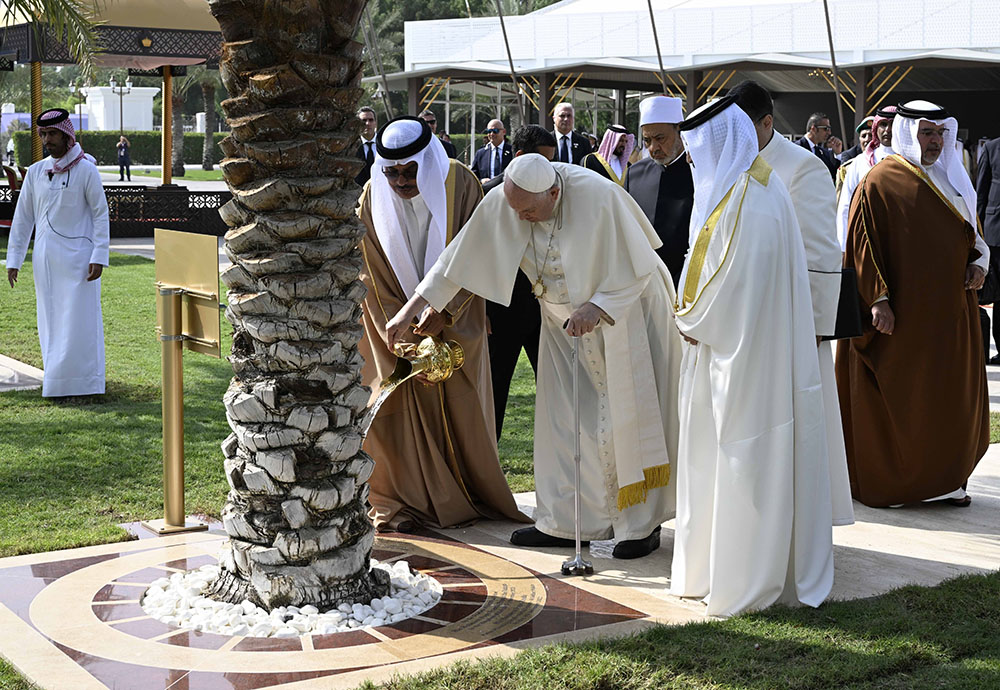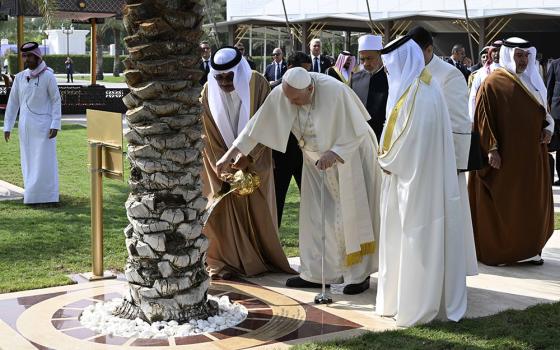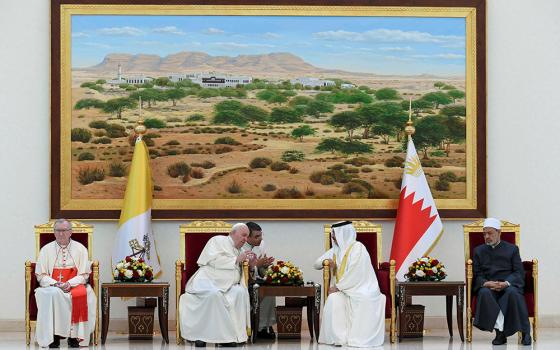
Pope Francis waters a palm tree before addressing the Bahrain Forum for Dialogue: East and West for Human Coexistence Nov. 4 in Awali, Bahrain. (CNS/Vatican Media)
Just days before world leaders gathered in Sharm El Sheikh, Egypt, for the Nov. 6 start of the 2022 United Nations Climate Change Conference, or COP27, Catholic and Muslim leaders met in the Persian Gulf kingdom of Bahrain for a major interreligious summit.
Environmental action was at the top of their list, with both Pope Francis and Sunni Islam's top cleric, the grand imam of Al Azhar in Egypt, calling on faith leaders to join forces in the fight against climate change.
Here are EarthBeat's top 5 takeaways of what they had to say:
- "How many trees are cut down, how many ecosystems are devastated, how many seas are polluted by our insatiable human greed, which then comes back to bite us! Let us work tirelessly in confronting this dramatic emergency and enact concrete and farsighted decisions inspired by concern for coming generations, before it is too late and their future is compromised! May the United Nations Climate Change Conference (COP27), to take place in Egypt a few days from now, mark a step forward in this regard!"
—Pope Francis on Nov. 3, meeting with Bahrain's civil authorities
- The environmental crisis "is a disaster caused by man freeing himself from the restrictions of religion and morals. It is one of the effects of 'selfishness' and the market economy, as well as the capitalist philosophy and its discourse which favors 'making as much profit as possible, even if that means selling everything."
—Professor Ahmed Al-Tayeb, grand imam of Al-Azhar on Nov. 4 in a speech to the Muslim Council of Elders
- "If we do not learn to take care of our surroundings — other people, our cities, our society, the environment — we will end up spending our lives like those people who are constantly in a hurry, running around, doing many things at once, but in the end are sad because they have never really known the joy of friendship and generosity."
—Pope Francis on Nov. 5 to young people in Bahrain
- The astronomical sums needed to tackle the climate crisis, while major industrial nations hold out on ethical and human funding, are very frightening. Our duty as religious scholars and clerics towards these disheartening international circumstances is to raise our voices and make a cry to authorities and those of obscene wealth and remind them of their fate and the fate of us all, if they do not act soon."
—Professor Ahmed Al-Tayeb, grand imam of Al-Azhar on Nov. 4 in a speech to the Muslim Council of Elders
- "Concern for environmental degradation is an interreligious reality: Religions possess the wisdom that can help bring about those changes in our lifestyles necessary to overcome the deterioration of the planet's conditions, and which embrace all areas of concern: environmental, economic, social, cultural and that of everyday life."
—Cardinal Miguel Ángel Ayuso Guixot, prefect of the Vatican's Dicastery for Interreligious Dialogue, on Nov. 4, in a speech to the Muslim Council of Elders
On the flight back to Rome, Francis told reporters that the Vatican's secretary of state, Cardinal Pietro Parolin, who is leading the Vatican's delegation at COP27, flew from Bahrain to Egypt on the same plane with the grand imam "together as brothers" — limiting CO2 emissions in the process.






